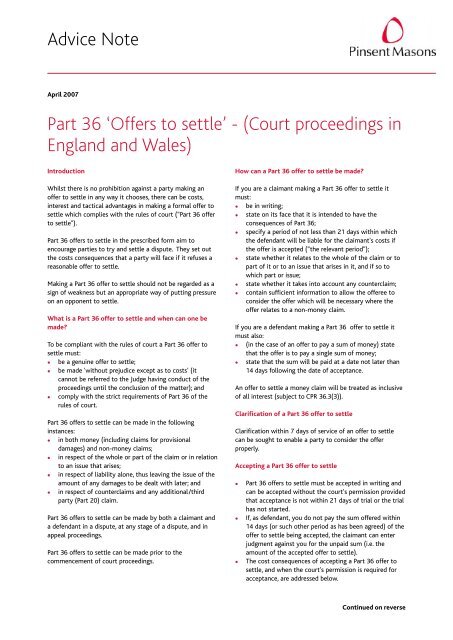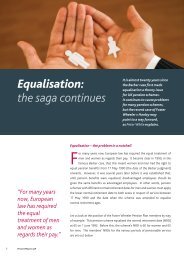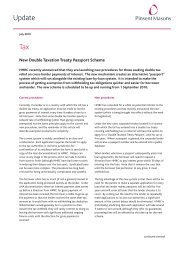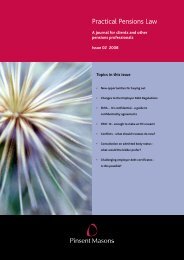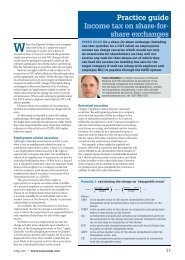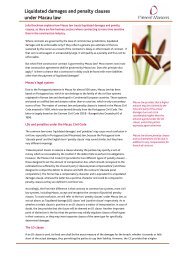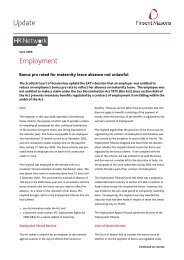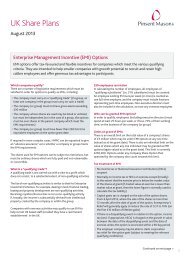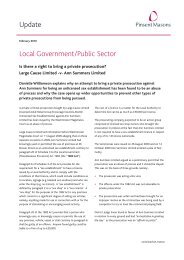Part 36 'Offers to settle' - April 07.qxp - Pinsent Masons
Part 36 'Offers to settle' - April 07.qxp - Pinsent Masons
Part 36 'Offers to settle' - April 07.qxp - Pinsent Masons
You also want an ePaper? Increase the reach of your titles
YUMPU automatically turns print PDFs into web optimized ePapers that Google loves.
Advice Note<br />
<strong>April</strong> 2007<br />
<strong>Part</strong> <strong>36</strong> ‘Offers <strong>to</strong> settle’ - (Court proceedings in<br />
England and Wales)<br />
Introduction<br />
Whilst there is no prohibition against a party making an<br />
offer <strong>to</strong> settle in any way it chooses, there can be costs,<br />
interest and tactical advantages in making a formal offer <strong>to</strong><br />
settle which complies with the rules of court ("<strong>Part</strong> <strong>36</strong> offer<br />
<strong>to</strong> settle").<br />
<strong>Part</strong> <strong>36</strong> offers <strong>to</strong> settle in the prescribed form aim <strong>to</strong><br />
encourage parties <strong>to</strong> try and settle a dispute. They set out<br />
the costs consequences that a party will face if it refuses a<br />
reasonable offer <strong>to</strong> settle.<br />
Making a <strong>Part</strong> <strong>36</strong> offer <strong>to</strong> settle should not be regarded as a<br />
sign of weakness but an appropriate way of putting pressure<br />
on an opponent <strong>to</strong> settle.<br />
What is a <strong>Part</strong> <strong>36</strong> offer <strong>to</strong> settle and when can one be<br />
made?<br />
To be compliant with the rules of court a <strong>Part</strong> <strong>36</strong> offer <strong>to</strong><br />
settle must:<br />
• be a genuine offer <strong>to</strong> settle;<br />
• be made 'without prejudice except as <strong>to</strong> costs' (it<br />
cannot be referred <strong>to</strong> the Judge having conduct of the<br />
proceedings until the conclusion of the matter); and<br />
• comply with the strict requirements of <strong>Part</strong> <strong>36</strong> of the<br />
rules of court.<br />
<strong>Part</strong> <strong>36</strong> offers <strong>to</strong> settle can be made in the following<br />
instances:<br />
• in both money (including claims for provisional<br />
damages) and non-money claims;<br />
• in respect of the whole or part of the claim or in relation<br />
<strong>to</strong> an issue that arises;<br />
• in respect of liability alone, thus leaving the issue of the<br />
amount of any damages <strong>to</strong> be dealt with later; and<br />
• in respect of counterclaims and any additional/third<br />
party (<strong>Part</strong> 20) claim.<br />
<strong>Part</strong> <strong>36</strong> offers <strong>to</strong> settle can be made by both a claimant and<br />
a defendant in a dispute, at any stage of a dispute, and in<br />
appeal proceedings.<br />
<strong>Part</strong> <strong>36</strong> offers <strong>to</strong> settle can be made prior <strong>to</strong> the<br />
commencement of court proceedings.<br />
How can a <strong>Part</strong> <strong>36</strong> offer <strong>to</strong> settle be made?<br />
If you are a claimant making a <strong>Part</strong> <strong>36</strong> offer <strong>to</strong> settle it<br />
must:<br />
• be in writing;<br />
• state on its face that it is intended <strong>to</strong> have the<br />
consequences of <strong>Part</strong> <strong>36</strong>;<br />
• specify a period of not less than 21 days within which<br />
the defendant will be liable for the claimant's costs if<br />
the offer is accepted ("the relevant period");<br />
• state whether it relates <strong>to</strong> the whole of the claim or <strong>to</strong><br />
part of it or <strong>to</strong> an issue that arises in it, and if so <strong>to</strong><br />
which part or issue;<br />
• state whether it takes in<strong>to</strong> account any counterclaim;<br />
• contain sufficient information <strong>to</strong> allow the offeree <strong>to</strong><br />
consider the offer which will be necessary where the<br />
offer relates <strong>to</strong> a non-money claim.<br />
If you are a defendant making a <strong>Part</strong> <strong>36</strong> offer <strong>to</strong> settle it<br />
must also:<br />
• (in the case of an offer <strong>to</strong> pay a sum of money) state<br />
that the offer is <strong>to</strong> pay a single sum of money;<br />
• state that the sum will be paid at a date not later than<br />
14 days following the date of acceptance.<br />
An offer <strong>to</strong> settle a money claim will be treated as inclusive<br />
of all interest (subject <strong>to</strong> CPR <strong>36</strong>.3(3)).<br />
Clarification of a <strong>Part</strong> <strong>36</strong> offer <strong>to</strong> settle<br />
Clarification within 7 days of service of an offer <strong>to</strong> settle<br />
can be sought <strong>to</strong> enable a party <strong>to</strong> consider the offer<br />
properly.<br />
Accepting a <strong>Part</strong> <strong>36</strong> offer <strong>to</strong> settle<br />
• <strong>Part</strong> <strong>36</strong> offers <strong>to</strong> settle must be accepted in writing and<br />
can be accepted without the court's permission provided<br />
that acceptance is not within 21 days of trial or the trial<br />
has not started.<br />
• If, as defendant, you do not pay the sum offered within<br />
14 days (or such other period as has been agreed) of the<br />
offer <strong>to</strong> settle being accepted, the claimant can enter<br />
judgment against you for the unpaid sum (i.e. the<br />
amount of the accepted offer <strong>to</strong> settle).<br />
• The cost consequences of accepting a <strong>Part</strong> <strong>36</strong> offer <strong>to</strong><br />
settle, and when the court's permission is required for<br />
acceptance, are addressed below.<br />
Continued on reverse
Costs and consequences of acceptance<br />
Generally speaking, if a <strong>Part</strong> <strong>36</strong> offer <strong>to</strong> settle is accepted<br />
within the relevant period:<br />
• the claimant is entitled <strong>to</strong> his costs of the proceedings<br />
up <strong>to</strong> the date of acceptance on the standard basis; and<br />
• the claim is stayed upon the terms of the offer.<br />
If a <strong>Part</strong> <strong>36</strong> offer <strong>to</strong> settle is accepted after expiry of the<br />
relevant period:<br />
• the parties must agree the liability for costs or, failing<br />
agreement, the court decides liability for costs. Unless<br />
the court orders otherwise, the claimant will be entitled<br />
<strong>to</strong> costs of the proceedings on the standard basis up <strong>to</strong><br />
the date on which the relevant period expired, and from<br />
thereon, the offeree will be liable for the offeror's costs<br />
on the standard basis from the date of expiry of the<br />
relevant period <strong>to</strong> the date of acceptance; and<br />
• the claim is stayed upon the terms of the offer.<br />
The claimant's costs will include any costs incurred in<br />
dealing with the defendant's counterclaim if the offer <strong>to</strong><br />
settle states that it takes the counterclaim in<strong>to</strong> account.<br />
As a <strong>Part</strong> <strong>36</strong> offer must specify a period of not less than 21<br />
days within which the defendant will be liable for the<br />
claimant's costs in accordance with CPR <strong>36</strong>.10 if the offer is<br />
accepted, if a claimant makes an offer <strong>to</strong> settle inclusive of<br />
costs, such offer will not be strictly in accordance with <strong>Part</strong><br />
<strong>36</strong>, and it will be in the court's discretion as <strong>to</strong> whether any<br />
cost or interest advantages will be given <strong>to</strong> the claimant<br />
making the offer if the offer is unreasonably rejected.<br />
Consequences of non-acceptance<br />
The consequences of not accepting a <strong>Part</strong> <strong>36</strong> offer <strong>to</strong> settle<br />
and the matter proceeding <strong>to</strong> trial are best illustrated by the<br />
following examples.<br />
Example 1: a claimant is claiming £350,000 but makes a <strong>Part</strong> <strong>36</strong> offer <strong>to</strong> settle for "£175,000 plus costs"<br />
Result after trial Consequence of not accepting the claimant's <strong>Part</strong> <strong>36</strong><br />
offer<br />
Claimant awarded £350,000<br />
Claimant awarded £175,000<br />
The claimant has won. Normally the defendant would expect<br />
<strong>to</strong> pay the claimant's costs on the standard basis, and <strong>to</strong> bear<br />
its own costs. However, as the claimant has beaten its <strong>Part</strong><br />
<strong>36</strong> offer <strong>to</strong> settle the court may order that the claimant also<br />
be entitled <strong>to</strong>:<br />
• interest on the £350,000 sum awarded at a rate not<br />
exceeding 10% above base rate, for some or all of the<br />
period starting on the date the relevant period expired;<br />
• costs on the indemnity basis from the date the relevant<br />
period expired; and<br />
• interest on those costs at a rate not exceeding 10% above<br />
base rate.<br />
Claimant has equalled its offer - the costs consequences set<br />
out above will normally apply; the claimant has obtained a<br />
judgment at least as advantageous as the terms of its own<br />
offer.<br />
Claimant awarded £100,000<br />
Claimant has not beaten its <strong>Part</strong> <strong>36</strong> offer <strong>to</strong> settle - the offer<br />
will normally be disregarded and the defendant will pay the<br />
claimant's costs on the standard basis, and bear its own costs.<br />
The claim is dismissed<br />
The defendant has won - the <strong>Part</strong> <strong>36</strong> offer <strong>to</strong> settle will be<br />
disregarded. The claimant will normally be ordered <strong>to</strong> pay all<br />
the defendant's costs on the standard basis, and the claimant<br />
will bear its own costs.
Example 2: a claimant is claiming £350,000 but the defendant makes an offer <strong>to</strong> pay "£175,000 plus costs"<br />
Result after trial Consequence of not accepting the claimant's <strong>Part</strong> <strong>36</strong><br />
offer<br />
Claimant awarded £350,000 Claimant has beaten the defendant's <strong>Part</strong> <strong>36</strong> offer <strong>to</strong> settle -<br />
the defendant's offer has no effect. The defendant will<br />
normally pay the claimant its costs on the standard basis and<br />
will bear its own costs.<br />
Claimant awarded £175,000<br />
Claimant awarded £100,000<br />
The claim is dismissed<br />
Although the claimant has won at trial, it has equalled, but<br />
not beaten the defendant's offer. The claimant may be<br />
awarded costs on the standard basis up <strong>to</strong> the last date the<br />
relevant period for acceptance of the offer <strong>to</strong> settle expired,<br />
and the court may order the claimant <strong>to</strong> pay any costs<br />
incurred by the defendant, and bear its own costs, from the<br />
last day of the relevant period on the standard basis.<br />
Although the claimant has won at trial, it has failed <strong>to</strong> beat<br />
the defendant's <strong>Part</strong> <strong>36</strong> offer <strong>to</strong> settle. The claimant may be<br />
awarded costs on the standard basis up <strong>to</strong> the last date the<br />
relevant period for acceptance of the offer <strong>to</strong> settle expired,<br />
and the court may order the claimant <strong>to</strong> pay any costs<br />
incurred by the defendant, and bear its own costs, from the<br />
last day of the relevant period on the standard basis.<br />
The defendant has won. The claimant will pay the defendant's<br />
costs on the standard basis and bear its own costs. There is no<br />
extra benefit in <strong>Part</strong> <strong>36</strong> <strong>to</strong> the defendant from having made<br />
the offer <strong>to</strong> settle.<br />
The above is intended <strong>to</strong> provide a general guide only as <strong>to</strong> the costs consequences of non acceptance of a <strong>Part</strong> <strong>36</strong> offer <strong>to</strong><br />
settle, and does not address all costs scenarios and potential orders at the end of trial.<br />
How <strong>to</strong> accept a <strong>Part</strong> <strong>36</strong> offer <strong>to</strong> settle<br />
• A <strong>Part</strong> <strong>36</strong> offer <strong>to</strong> settle is accepted by serving written<br />
notice of the acceptance on the offeror (CPR <strong>36</strong>.9(1)).<br />
• Service should be made on the offeror's legal<br />
representative if he has one and the notice filed with the<br />
court (where proceedings are underway).<br />
• Unlike the old regime there are no formal requirements<br />
for the notice of acceptance. A letter identifying the<br />
claim number and title (where proceedings have been<br />
commenced) and the offer <strong>to</strong> settle <strong>to</strong> which it relates<br />
should be sufficient.<br />
Date of acceptance<br />
Although the Rules do not state when acceptance will be<br />
effected, date of acceptance should be taken <strong>to</strong> be the date<br />
the acceptance notice was served on the offeree or his legal<br />
representative.<br />
When can an offer <strong>to</strong> settle be accepted?<br />
Provided that the offer has not been withdrawn (see below) ,<br />
an offer <strong>to</strong> settle can be accepted at any time, subject <strong>to</strong><br />
circumstances when permission of the court is required.<br />
When is the court's permission required?<br />
Permission of the court will only be required <strong>to</strong> accept a <strong>Part</strong><br />
<strong>36</strong> offer <strong>to</strong> settle:<br />
• where the claimant wishes <strong>to</strong> accept an offer <strong>to</strong> settle<br />
made by one or more, but not all, of a number of<br />
defendants and certain requirements are not satisfied;<br />
• where the trial has started; and<br />
• in a number of other limited circumstances; in particular<br />
relating <strong>to</strong> personal injury claims.<br />
Under the old regime, the court's permission was required <strong>to</strong><br />
accept <strong>Part</strong> <strong>36</strong> offers after expiry of the 21 day relevant<br />
period or where the offer was made within 21 days of trial,<br />
unless the parties were able <strong>to</strong> agree liability for costs. Under<br />
the new regime permission is no longer required in these<br />
circumstances, and where liability for costs cannot be agreed,<br />
the parties should apply <strong>to</strong> court for a costs order (CPR<br />
<strong>36</strong>.10(4)).<br />
Execution and enforcement<br />
• An offer <strong>to</strong> pay a single sum of money must, unless the<br />
parties have otherwise agreed in writing, be paid within<br />
14 days of the date of acceptance (CPR <strong>36</strong>.11(6)). If not
paid within 14 days or the period agreed, the offeree may<br />
enter judgment for the unpaid sum (CPR <strong>36</strong>.11(6) and<br />
(7)).<br />
• For any other type of offer (e.g. an agreement <strong>to</strong> vacate<br />
premises, deliver up documents etc), the Rules provide<br />
that where such an offer is accepted and a party alleges<br />
that the other party has not honoured its terms, that<br />
party may apply <strong>to</strong> enforce the terms of the offer without<br />
the need for a new claim (CPR <strong>36</strong>.11(8)).<br />
Can a <strong>Part</strong> <strong>36</strong> offer <strong>to</strong> settle be withdrawn and what are<br />
the consequences?<br />
• Before expiry of the relevant period a <strong>Part</strong> <strong>36</strong> offer <strong>to</strong><br />
settle can only be withdrawn or its terms changed <strong>to</strong> be<br />
less advantageous <strong>to</strong> the offeree if the court gives<br />
permission (CPR <strong>36</strong>.3(5)).<br />
• The court's permission is not required if the offeror<br />
withdraws the offer or changes its terms <strong>to</strong> be less<br />
advantageous <strong>to</strong> the offeree after expiry of the relevant<br />
period, provided that the offeree has not previously served<br />
notice of acceptance (CPR <strong>36</strong>.3(6)).<br />
• The Rules do not state what the grounds for permission<br />
are, but it is anticipated that they will be similar <strong>to</strong> the<br />
grounds that needed <strong>to</strong> be established <strong>to</strong> withdraw or<br />
reduce a payment in under the old regime. Consequently,<br />
an offeror has <strong>to</strong> be able <strong>to</strong> show that there has been a<br />
sufficient change of circumstances so that it is just that<br />
he has the opportunity <strong>to</strong> withdraw/revise the <strong>Part</strong> <strong>36</strong><br />
offer <strong>to</strong> settle.<br />
• Withdrawal or a change in terms is effected by serving<br />
written notice <strong>to</strong> that effect on the offeree/his legal<br />
representative.<br />
• Once withdrawn, the <strong>Part</strong> <strong>36</strong> offer will NOT attract the<br />
<strong>Part</strong> <strong>36</strong> costs and interest consequences (CPR<br />
<strong>36</strong>.14(6)(a)), although it may be possible <strong>to</strong> argue that<br />
they apply under the court's general costs discretion (CPR<br />
44.3).<br />
In what circumstances should you consider making a <strong>Part</strong><br />
<strong>36</strong> offer <strong>to</strong> settle?<br />
• They should at least be considered in all cases in order <strong>to</strong><br />
achieve the best costs and interest on costs scenario if<br />
the matter has <strong>to</strong> proceed <strong>to</strong> trial.<br />
• The making of a <strong>Part</strong> <strong>36</strong> offer <strong>to</strong> settle can focus an<br />
opponent's mind, and even if not accepted, may lead <strong>to</strong> a<br />
commercial settlement of the dispute. They increase the<br />
risk of proceeding with the litigation for the opponent.<br />
• If accepted a <strong>Part</strong> <strong>36</strong> offer <strong>to</strong> settle can avoid the time<br />
and potential irrecoverable costs associated with court<br />
proceedings.<br />
• A <strong>Part</strong> <strong>36</strong> offer <strong>to</strong> settle may not be appropriate where a<br />
defendant does not wish <strong>to</strong> pay a claimant's costs, or in<br />
respect of claims being dealt with on the small claims<br />
track.<br />
Key Point <strong>to</strong> Remember<br />
• <strong>Part</strong> <strong>36</strong> offers <strong>to</strong> settle are formal offers which have costs<br />
consequences if not accepted.<br />
• If making a <strong>Part</strong> <strong>36</strong> offer <strong>to</strong> settle, make it as clear as<br />
possible - use CPR <strong>36</strong>.2 as a checklist.<br />
• Keep a record of <strong>Part</strong> <strong>36</strong> offers made and constantly<br />
moni<strong>to</strong>r and re-evaluate the position, as offers not<br />
withdrawn may remain open <strong>to</strong> acceptance.<br />
• If making an offer <strong>to</strong> settle or accepting the claimant's<br />
offer, defendants need <strong>to</strong> bear in mind that payment has<br />
<strong>to</strong> be made within 14 days failing which judgment can be<br />
entered against them. Therefore ensure that payment can<br />
be made or try and agree an extension of time for<br />
payment.<br />
• If not accepted, the important question on costs is not<br />
which party has won, but whether the eventual judgment<br />
is at least as or more advantageous than the offer.<br />
• <strong>Part</strong> <strong>36</strong> offers <strong>to</strong> settle must not be mentioned <strong>to</strong> the trial<br />
judge until after all questions of liability and quantum are<br />
determined.<br />
• Whilst nothing in respect of <strong>Part</strong> <strong>36</strong> prevents a party<br />
making an offer <strong>to</strong> settle in whatever way it chooses, if<br />
the offer is not made in accordance with the prescribed<br />
form and content (CPR <strong>36</strong>.2), it will not have the costs<br />
and interest consequences prescribed in <strong>Part</strong> <strong>36</strong> as<br />
referred <strong>to</strong> above.<br />
• If a <strong>Part</strong> <strong>36</strong> offer <strong>to</strong> settle is not made, or is made but is<br />
not successful at trial, in deciding what order (if any) <strong>to</strong><br />
make about costs, the court will have regard <strong>to</strong> all the<br />
circumstances of the matter; including the conduct of the<br />
parties, the failure of a party <strong>to</strong> be wholly successful in<br />
respect of its claim, a party's failure in respect of specific<br />
issues, and any other relevant fac<strong>to</strong>rs. Following a<br />
'successful' <strong>Part</strong> <strong>36</strong> offer <strong>to</strong> settle, a party will obtain the<br />
benefit of the costs consequences as specified in <strong>Part</strong> <strong>36</strong>.<br />
For further information contact your usual legal advisor or<br />
contact our Law Costs Consultant, Keith Levene by email:<br />
keith.levene@pinsentmasons.com.<br />
This Advice Note is designed <strong>to</strong> contribute <strong>to</strong> the<br />
understanding of legal issues. It cannot, however, by its nature<br />
be definitive or exhaustive. Accordingly, specific professional<br />
advice should be sought on any issue or course of action you<br />
may be considering.<br />
This note does not constitute legal advice.Specific legal advice should be taken before acting on any of the <strong>to</strong>pics covered.<br />
LONDON BIRMINGHAM BRISTOL EDINBURGH GLASGOW LEEDS MANCHESTER BEIJING BRUSSELS DUBAI HONG KONG SHANGHAI<br />
T 0845 300 32 32 www.pinsentmasons.com


